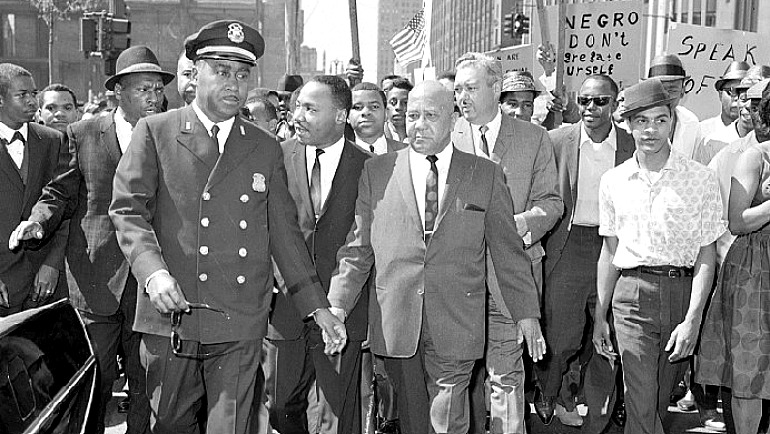
What did the civil rights movement look like in Detroit? How did it influence future movements and politics? Who were the civil rights freedom fighters in Detroit, and how did they affect change?
To tell and preserve the stories of these civil rights pioneers, Junius Williams, founder of Rise Up North and civil rights activist, and Peter Blackmer, lead researcher for Rise Up North and a research fellow at Wayne State’s Detroit Equity Action Lab, are launching Rise Up Detroit. This online resource uses research and materials from Wayne State’s Reuther Library and other Detroit sources to tell stories of resistance through written, oral and visual materials from the civil rights and black power movements in Detroit.
The website will officially launch with a kickoff event at 4 p.m. Tuesday, May 14, in the Community Room of Wayne State University’s David Adamany Undergraduate Library. The program will begin with an introduction to the website followed by a panel discussion featuring local civil rights veterans and experts.
For Williams, the site’s launch represents the culmination of his desire to tell the stories of civil rights veterans who have passed on.
“One day, we looked around and realized that many of our friends — and enemies — who made that journey, or similar journeys, were no longer with us to laugh with, relive old conquests or just tell lies,” said Williams.
“The stories are being lost,” said Blackmer. “Rise Up Detroit not only seeks to preserve that history but also to educate and empower users with lessons that they learn from the civil rights activists who were a part of the movement in Detroit.”
Rise Up Detroit is part of the Rise Up North project created by Williams to teach the lessons of African American struggles for empowerment in the nation’s major urban centers in the north. The project began with Rise Up Newark. Detroit was selected as the second city due to its parallels with Newark during the civil rights movement. “Detroit was a natural next step as we thought about creating a picture of what the civil rights movement looked like in the north,” said Blackmer. “As we build the resource, we’ll focus on cities that played — and continue to play — such an important role in black freedom struggles.”
Rise Up Detroit comprises three chapters: Chapter One: Migrations, Power, and Politics; Chapter Two: Black Freedom Struggles in Post-War Era Detroit; and Chapter Three: Civil Rights and Black Power in Detroit, which explores the emergence and evolution of the civil rights movement, the 1967 rebellion, and the era of black power, leading up to the election of Detroit Mayor Coleman Young.
Rise Up North is an educational tool for students and teachers from K-12 through college that promotes research and preserves the record of people who were “foot soldiers” in the civil rights, black power, and other movements in the northern United States. It is a means by which to teach social justice issues through the history of the African American struggle for power and keep these stories alive for generations to come. For more information visit riseupnewark.com.
The Wayne State University Library System consists of the university's five libraries: The David Adamany Undergraduate Library, the Purdy/Kresge Library, the Shiffman Medical Library, the Arthur Neef Law Library and the Reuther Library as well as the School of Information Sciences.
